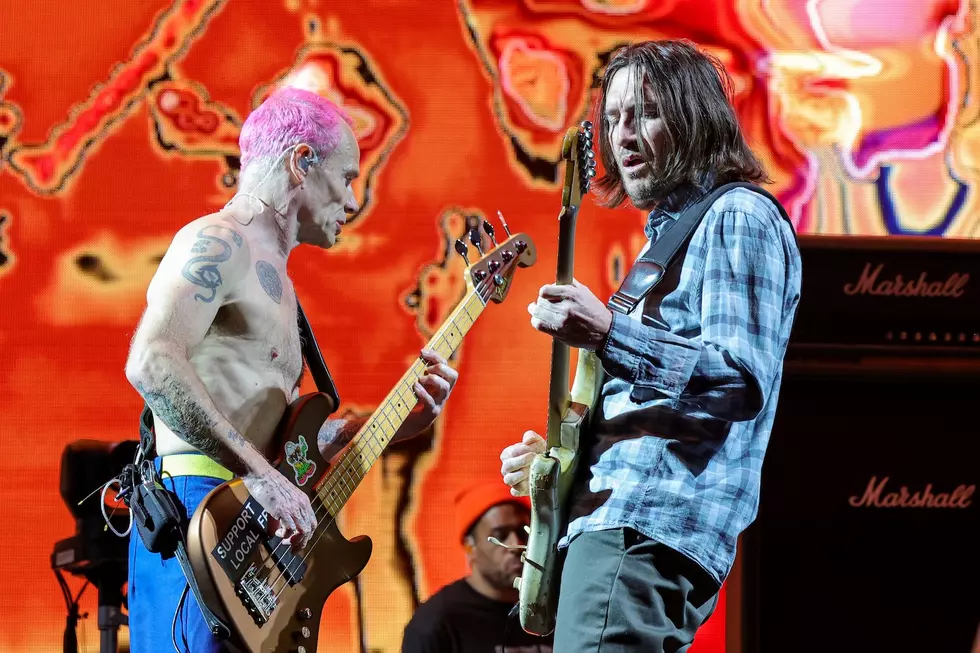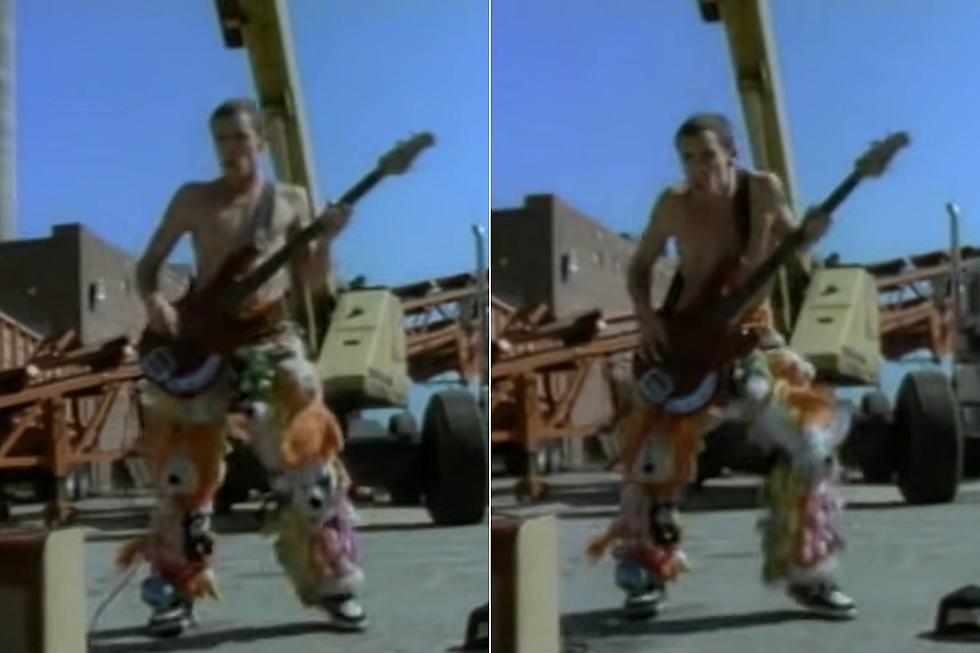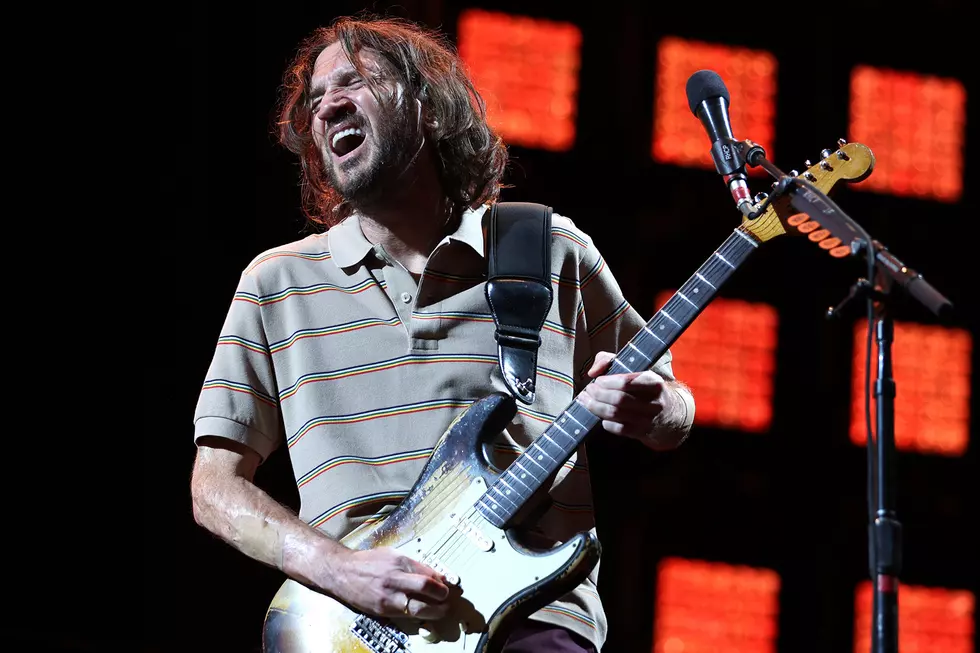
How Red Hot Chili Peppers Dealt With Turmoil on ‘One Hot Minute’
The Red Hot Chili Peppers needed nearly four years to finish One Hot Minute, but the title was still at least partly appropriate, given that it roughly summed up the length of time it took the band to start falling apart after the breakout success of their previous album.
The Red Hot Chili Peppers had already weathered a career's worth of storms by the time they released their fifth LP, 1991's Blood Sugar Sex Magik, including the death of original guitarist Hillel Slovak, the abrupt departure of drummer Jack Irons, and singer Anthony Kiedis' life-threatening struggles with drug addiction — and Magik's multi-platinum sales initially seemed to signal the start of a new, less turbulent chapter in the band's history.
But that kind of popularity can affect artists in unpredictable ways, and things started getting bumpy before they'd even managed to finish the tour.
For guitarist John Frusciante, who was only 18 when he replaced Slovak in the lineup, the Chili Peppers' increased profile proved particularly problematic. "It was too high, too far, too soon," he told NY Rock years later. "Everything happened — or better, everything seemed to be happening — at once, and I just couldn't cope with it."
Frusciante's discomfort manifested itself in a number of ways, starting with band arguments that spread into the guitarist tanking performances on what was shaping up as the group's biggest tour to that point — a tour that was thrown into disarray when he quit during a series of Japanese dates in 1992.
The group would eventually find a replacement in the form of former Jane's Addiction guitarist Dave Navarro, but they'd still face some serious obstacles on the way to their next LP, starting with a trip to the dentist Kiedis took in early 1994. Several years sober at the time, Kiedis suffered a serious relapse after being given prescription painkillers, and his inability to stay straight prolonged the recording process considerably.
"Anthony is not a party drug user," bassist Flea told GQ in 2011. "When he goes on a binge, he disappears for weeks at a time. We finished recording the music for One Hot Minute in 1994, but he didn't get around to the vocals for another year."
Substance abuse wasn't the only struggle Kiedis faced. As he later admitted in his autobiography, Scar Tissue, he also found it difficult to find a creative groove with Navarro, whose writing style differed from his predecessors' in ways that stymied the singer.
"John Frusciante had been a true anomaly when it came to songwriting. He made it even easier than Hillel Slovak to create music, even though I'd known Hillel for years," wrote Kiedis. "I just figured that was how all guitar players were — that you showed them your lyrics and sang a little bit and the next thing you knew you had a song. That didn't happen right off the bat with Dave."
Watch Red Hot Chili Peppers' Video for 'Aeroplane'
The end result, released Sept. 12, 1995, proved a dark stylistic detour in a number of ways. Navarro's arrival triggered a shift in the Red Hot Chili Peppers' sound, and Kiedis' struggles forced his bandmates to step up further — including Flea, who contributed lyrics for the first time as well as handling lead vocals on the song "Pea."
Radio proved receptive to the album, sending the singles "Warped," "My Friends," and "Aeroplane" into the upper reaches of the Mainstream and Modern Rock charts, but the overall reaction was mixed, and sales fell short of the standard set by Blood Sugar Sex Magik.
And even after the album came out, the Red Hot Chili Peppers' troubles weren't over. A planned tour was scrapped after 16 shows when drummer Chad Smith broke his wrist. They managed to get through their 1996 dates largely without incident, but were then forced to cancel another round of dates the following year: Kiedis was injured in a motorcycle accident and fell into another relapse after his hospital stay.
Overall band morale was at a low point. Their only concert of the year, at the Fuji Rock Festival on July 26, 1997, ended up being cut short by a typhoon. Something was bound to break, and the weak link turned out to be Navarro, who'd entered his own spiral into substance abuse and remained an awkward creative fit for Kiedis.
During sessions for an attempted follow-up to One Hot Minute, those tensions boiled over and he was ultimately fired — clearing the way for Frusciante's surprising return in the spring of 1998, the renewed energy from which spilled directly over into a trio of bestselling LPs that started with Californication the following year.
Kiedis described the reunited lineup's first jam session as a pivotal moment that proved, despite everything they'd been through, the group still had music left to make.
"For me, that was the defining moment of what would become the next six years of our lives together," he said of Frusciante's return in Scar Tissue. "That was when I knew that this was the real deal, that the magic was about to happen again," he wrote. "Suddenly we could all hear, we could all listen, and instead of being caught up in our finite little balls of bullshit, we could all become players in that great universal orchestra again."
Perhaps unsurprisingly, songs from One Hot Minute remained largely absent from the Red Hot Chili Peppers' live sets over the years. As Smith hinted during a Reddit AMA in 2014, that seems motivated by the band members' collective desire to move past a particularly troubled period in their shared history.
"We don't really feel that connected to that record anymore," Smith admitted. "No special reason, not to say we would never play those songs — but we don't feel that emotionally connected to that music right now."
See Red Hot Chili Peppers Among the Top 100 Albums of the '90s
More From Ultimate Classic Rock









